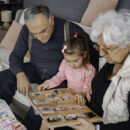Social Interactions
I’ll be pleasantly blunt here. Positive social relationships are like milkshakes to the brain. That includes the circumstances where the brain needs it most: when it’s under stress.

I’ll be pleasantly blunt here. Positive social relationships are like milkshakes to the brain. That includes the circumstances where the brain needs it most: when it’s under stress.
If you want to experience one of the most powerful stress reduction protocols ever measured, spend quality time with friends. It’s so powerful it can even affect your death rate, especially if you’re a senior. The probability of death is 45% greater for elderly populations who are lonely than for seniors who are social butterflies.
One way to show the effects of social behaviors at any age is to consider the effects of social interactions on depression and anxiety. People who are socially inactive are way more depressed than people who are socially active. These friendly folks also suffer less anxiety.
One of the most powerful interactions are intergenerational in nature. The more time you spend with people who are younger – or older – than yourself, the less risk you have for experiencing depression – and the stress with which it’s associated. You need to spend time with people who positively interact with you, but it isn’t just close friends, it’s anybody.
There are benefits beyond mental health. People who are high socializers have better immune systems – so they get sick less often, and suffer less from cancer. That gave researchers a hint as to the molecular mechanisms behind the finding that friends are natural stress reducers.
The culprit turns out to be cortisol, a canonical stress hormone usually involved in so-called fight or flight behaviors. Elevated cortisol levels knock out parts of the immune system. That’s why when you’re stressed, you’re more likely to catch an infectious disease.
But researchers showed that stress hormones also have social implications. Cortisol levels are lowered when you’re in the company of people around whom you feel safe. The more time spent, the better the effect. That’s why having friends not only makes you friendlier, and more stress resistant, it also makes you less sick.
Socialization is so powerful it even works if you can’t have your interactions face to face. A group of 80 year olds had their executive function scores evaluated, then given video-chat machines. They were to use the machines for social interactions 30 minutes a day for 6 weeks. Their executive function scores were then re-evaluated. And they improved dramatically. We so want to interact with other people, even if all we have is a computer screen, the brain will still respond.
The bottom line is one of the happiest things I’ve had the joy of saying in this series. If you’re really serious about reducing your stress, spend time positively interacting with people. Your brain will lick its lips.
Like I said, it’s like giving it a milkshake.










